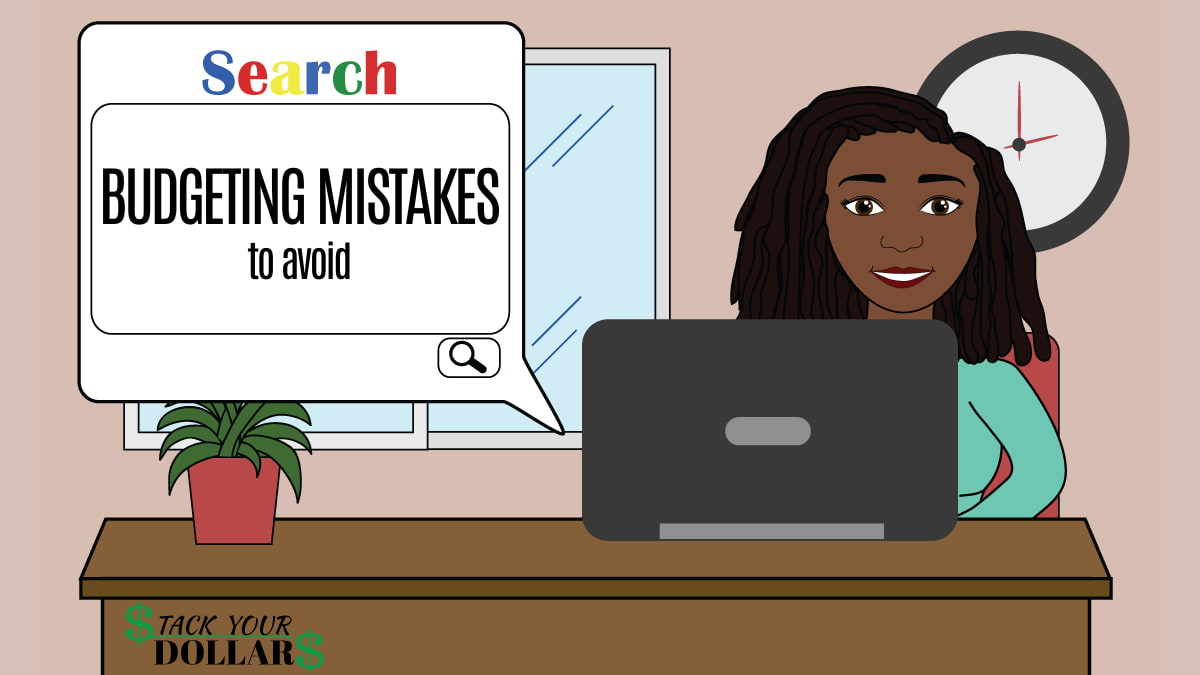In times of economic uncertainty, the significance of saving money has intensified. Undoubtedly, effective budgeting is crucial for not only saving money but also navigating through an unpredictable economy.
Before embarking on creating a budget, it’s vital to be aware of potential pitfalls that can turn it into a financial disaster. So, let’s talk about some common budgeting mistakes and how to steer clear of them.

1. Ignoring the Importance of Tracking Expenses
One of the most common mistakes is not keeping a close eye on where your money is going. Start by tracking your expenses diligently, whether it’s with a budgeting app or a good old spreadsheet. This way, you’ll know exactly where your hard-earned cash is headed.
How to Avoid This:
- Set aside some time each week to review your expenses.
- Use budgeting apps or tools to automate the process. This simple habit keeps you aware and in control of your spending.
- Review your spending regularly to identify patterns and areas for improvement.
2. Lack of Flexibility in Your Budget
Setting a fixed budget is a commendable effort, but rigidity can lead to significant challenges. Imagine establishing a household budget of $5000 while your income is $5200 – on paper, it seems flawless. However, the lack of flexibility becomes apparent when an unexpected expense arises.
Living on the bare minimum to adhere strictly to the budget might work momentarily, but it’s not a sustainable approach. While you may successfully navigate this frugal lifestyle initially, the journey becomes increasingly frustrating. The reality is that stringent budgets often struggle to accommodate the ebb and flow of monthly variations, making consistent adherence a challenging feat.
To avoid the pitfalls of an inflexible budget, it’s crucial to strike a balance between financial discipline and adaptability. Setting realistic goals, accounting for potential unforeseen expenses, and periodically reassessing and adjusting the budget can contribute to a more sustainable and stress-free financial management approach.
How to Avoid This:
- Set realistic goals when creating your budget.
- Calculate regular monthly expenses and base your budget on those figures.
- Identify and cut down on impulsive purchases, such as dining out frequently or reckless shopping.
- If certain expenses are non-negotiable, look for alternative areas to cut costs, like opting for a basic Netflix plan or choosing a local hairstylist for haircuts.
3. Neglecting to Establish an Emergency Fund
The vulnerability of a budget becomes glaringly evident when an emergency fund is neglected. Unforeseen expenses, ranging from sudden car repairs to unexpected home renovations or family emergencies, can throw a wrench into even the most meticulously planned budgets.
Read More: 7 Emergency Fund Examples You Should Prepare For
If you haven’t saved for these unexpected situations, you might end up breaking your budget, especially when facing a sudden medical issue. Even if you’re usually good at sticking to your budget, unexpected expenses can still throw off your financial plans.
To make sure your budget stays strong, it’s smart to have an emergency fund. It’s like a safety net for your money. It helps you handle unexpected expenses without wrecking your budget, giving you some peace of mind and keeping your finances on track.
How to Avoid This:
- Allocate a portion of your income each month to build a robust emergency fund.
- Consider opening a savings account with automatic deductions to accumulate funds for unexpected expenses.
4. Lack of Communication with Your Spouse
Failure to communicate about financial matters with your partner can lead to budgetary chaos. If one partner is adhering to the budget while the other spends freely, it becomes challenging to achieve mutual financial goals.
How to Avoid This:
- Initiate open and honest discussions about money while addressing both partners’ wants, goals, and needs.
- Determine individual spending limits and set ground rules for expenses.
- Share financial goals and work collaboratively towards achieving them.
5. Credit Card Mismanagement
Credit cards are a double-edged sword. If not used wisely, they can lead to debt that’s tough to climb out of. Always pay your credit card bills in full and on time. It not only saves you from unnecessary interest but also helps build a solid credit score, opening doors to better financial opportunities down the road.
How to Avoid This:
- Pay your credit card bills in full and on time to avoid accumulating interest.
- Set a monthly credit card spending limit that aligns with your budget to prevent excessive debt.
Conclusion
Preventing financial mishaps in any economic situation becomes more manageable when potential areas for expense reduction are identified. A well-crafted household budget serves as a tool to pinpoint these areas.
I hope these tips and strategies help you navigate the budgeting journey smoothly. Remember, it’s all about finding a balance that works for you. Feel free to reach out if you have any questions or need more advice.

So true! Crazy things come up all the time so you need some wiggle room in your budget for sure. And your partner and you need to discuss money and goals regularly in my opinion. Great post!
Yes! Thank you. If I had known to have a deep discussion with my husband beforehand, it would have avoided many headaches!